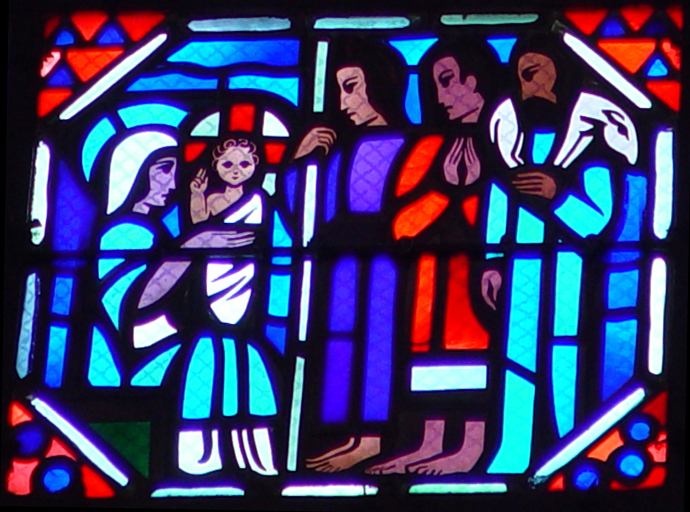 “Therefore he had to be made like his brothers in every respect, so that he might become a merciful and faithful high priest in the service of God, to make propitiation for the sins of the people.” – Hebrews 2:17, ESV
“Therefore he had to be made like his brothers in every respect, so that he might become a merciful and faithful high priest in the service of God, to make propitiation for the sins of the people.” – Hebrews 2:17, ESV
Reflection
As you study the creation narrative in Genesis, you’ll notice that in the five days leading up to the creation of humanity, the result was good, whereas the result of the sixth day was very good. This suggests that humankind was God’s crowning achievement. We, as humans, are made in God’s image and that is precisely why we were given dominion over creation, rather than creation having dominion over us. Humans are very good, at least in their pre-fallen state, and even the creation itself is good, at least prior to its being marred by sin. But the Scriptures also teach that, even in spite of sin, the physical world retains a vestige of its original goodness.
As such, the physical world matters to God, and this fact is most profoundly illustrated in the first coming of Christ. Indeed, the author of Hebrews makes it clear: for the forgiveness of our sins, it was essential that Christ became a man.
Furthermore, the second advent of Christ highlights the culminating glorification of the physical world, including our bodies. And although it’s true that our bodies yearn for their heavenly home, and that in a profound sense we are strangers in a foreign land, it’s also true that our earthly experiences and the bodies we now possess are a just preview of what is yet to come. According to C.S. Lewis: “They are the scent of a flower we have not found, the echo of a tune we have not heard, and news from a country we have never yet visited.”
In other words, we were meant for this world, but for a better version of it, and we were meant for these bodies, but for better versions of them. That is, we were meant for the new heaven and new earth.
Upon this foundation the doctrine of common grace can be grasped most vividly, along with its implications for the value of extra-biblical knowledge. Through an act of unmerited grace, God has endowed humans with the ability and skills to grasp the nature of the world around them. Indeed, even the unredeemed sinner is capable of penetrating insights into the human condition, the invention of technological marvels, and works of breathtaking beauty.
It follows that Christians, although irrevocably committed to the authority of Scripture, should at times appeal to the work of the unredeemed, in the hopes of thereby shedding light on the nature of their own work. In this way, believers and unbelievers, in the most ideal scenario, can even partner together to achieve one of the most laudable of human goals: the common good. This is especially true in my own field of philosophy, in which for centuries followers of Christ have benefited immensely from “pagan” systems of thought. These perspectives have provided Christian philosophers with numerous resources for articulating, clarifying, and even defending their most cherished beliefs.
During this advent season, let us remember God’s love for the world, so potently expressed through his act of creation and ultimately through the person of Jesus Christ. And as Christian scholars, in particular, let our labors here in the physical world always be a reflection of these vital spiritual truths, for the good of humankind and the glory of God.
Questions
- Why is the physical world valuable to God?
- Is this value reflected in our teaching and preaching?
- How can my work, as a Christian scholar, be influenced by the reality of the advent?
Prayer
O heavenly father, who hast filled the world with beauty: Open our eyes to behold thy gracious hand in all thy works; that, rejoicing in thy whole creation, we may learn to serve thee with gladness; for the sake of him through whom all things were made, thy Son Jesus Christ our Lord. Amen. — The Book of Common Prayer
Further Reading
Steven Garber, Visions of Vocation: Common Grace for the Common Good (IVP: 2014).
C. S. Lewis, The Weight of Glory (HarperOne, 2009).
Notes on Image:
“Adoration of the Shepherds,” Le Breton, Jacques ; Gaudin, Jean. Image courtesy of Art in the Christian Tradition database, maintained by the Jean and Alexander Heard Library at Vanderbilt University.
Record number: [51557]
David Leonard teaches philosophy in the Atlanta area, is a freelance writer and editor, and is passionate about equipping Christians to discover their vocations. He has been published in Christianity Today, CASE Magazine, and the Southern Journal of Philosophy, and has spoken at conferences for the John Templeton Foundation, Global Scholars, and the Evangelical Philosophical Society. David holds the M.A. from Denver Seminary and the Ph.D. from the University of Arkansas. Follow him on Twitter @DrDavidLeonard.

Excellent points! Many Christians reject economics and insist on staying with the knowledge of economics that people in the Bible understand. This is especially true of helping the poor. The Bible offers only charity as a means to helping the poor, but we now know that free markets and investing in new businesses does much more to help them.